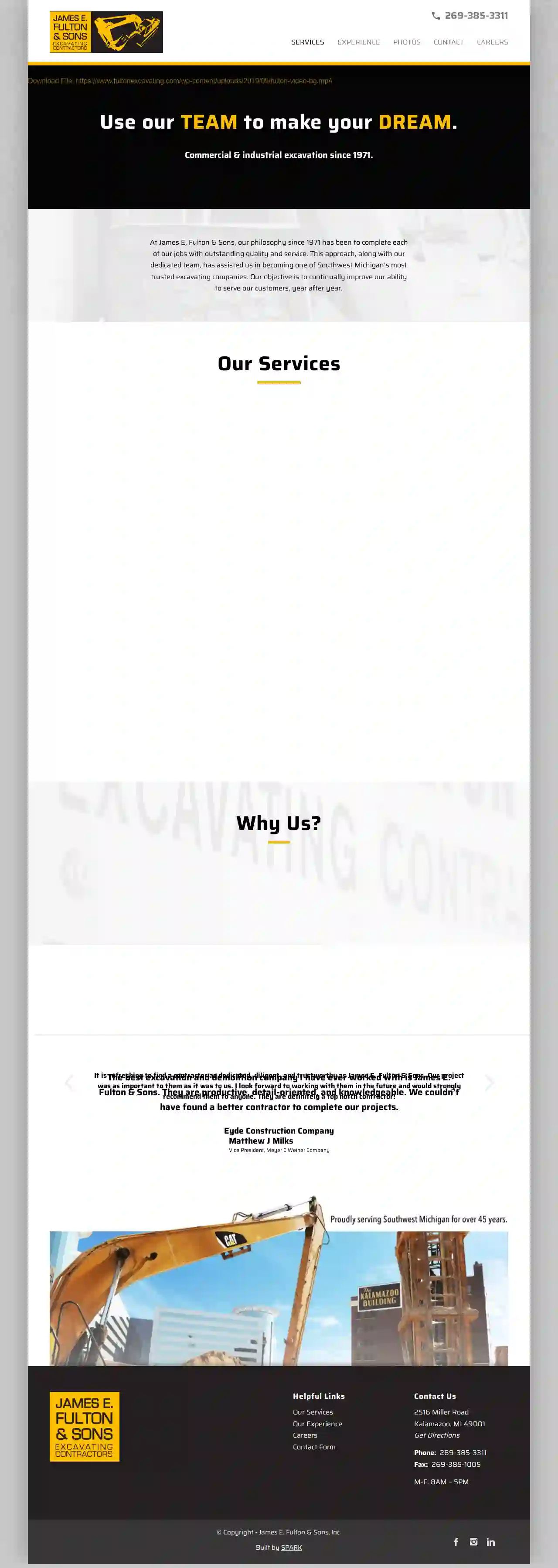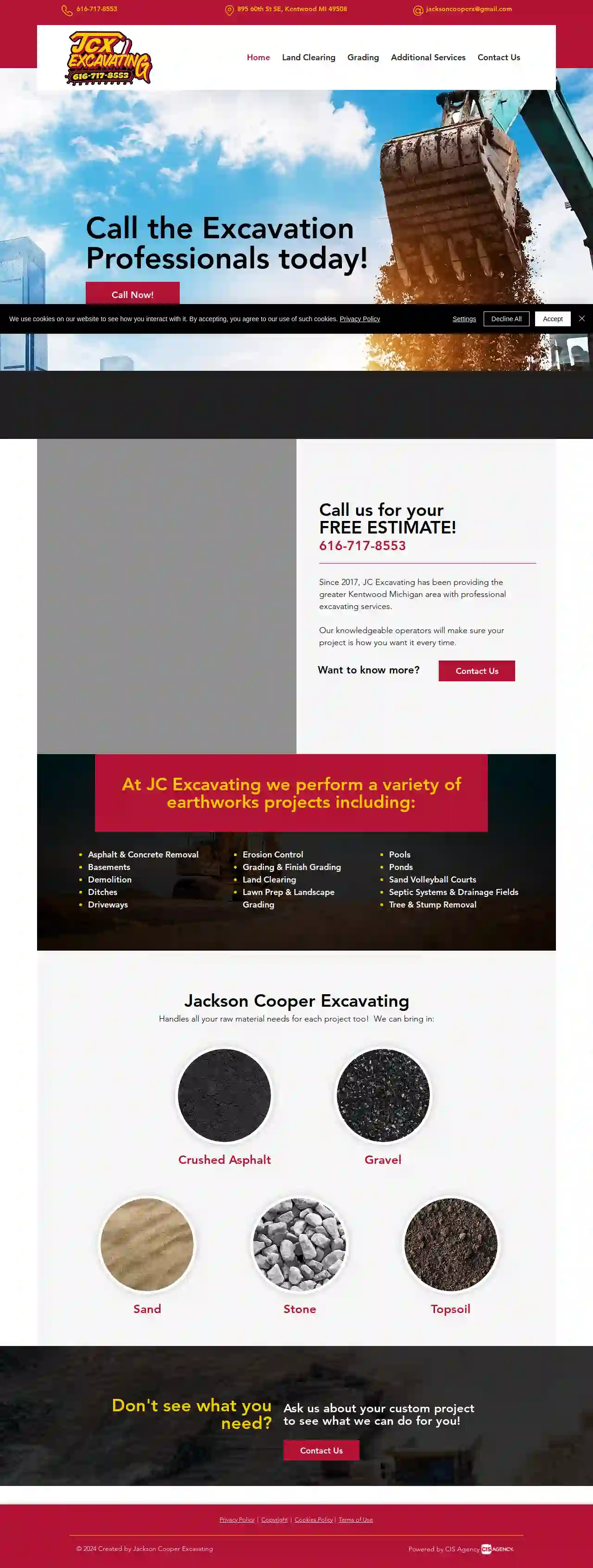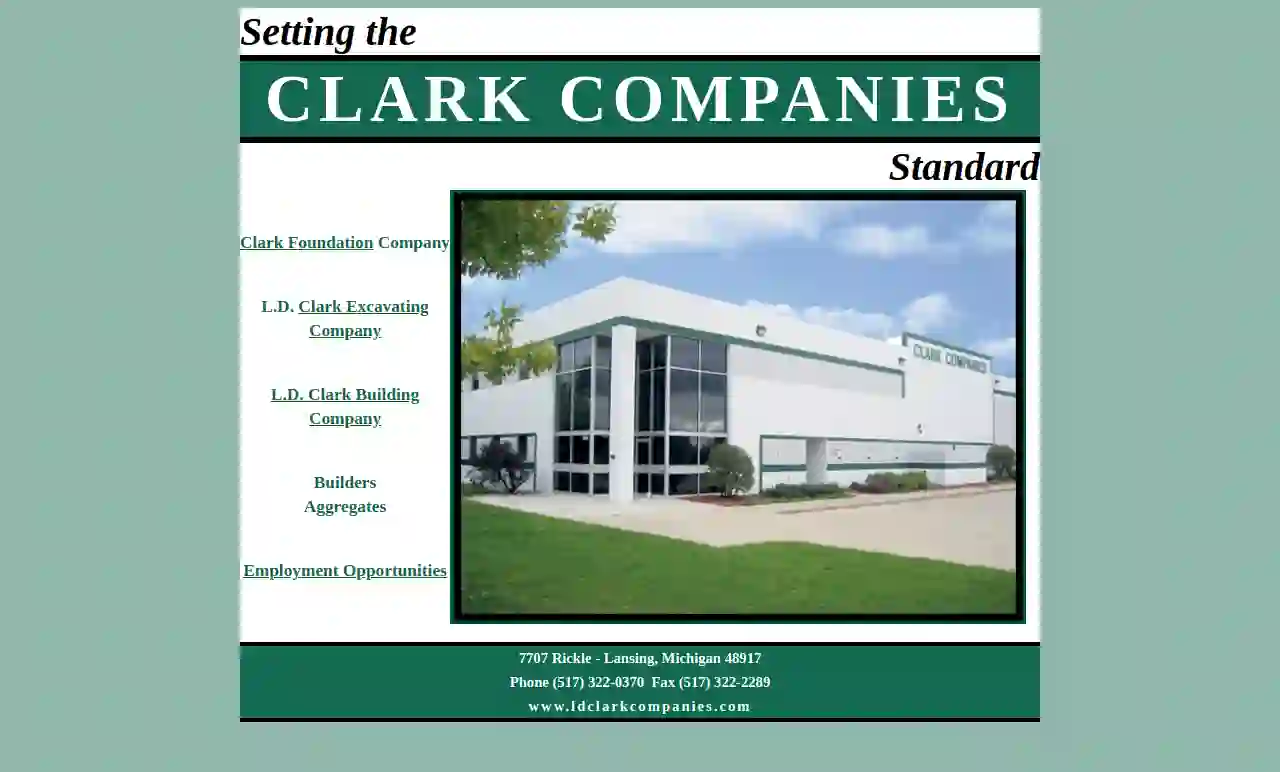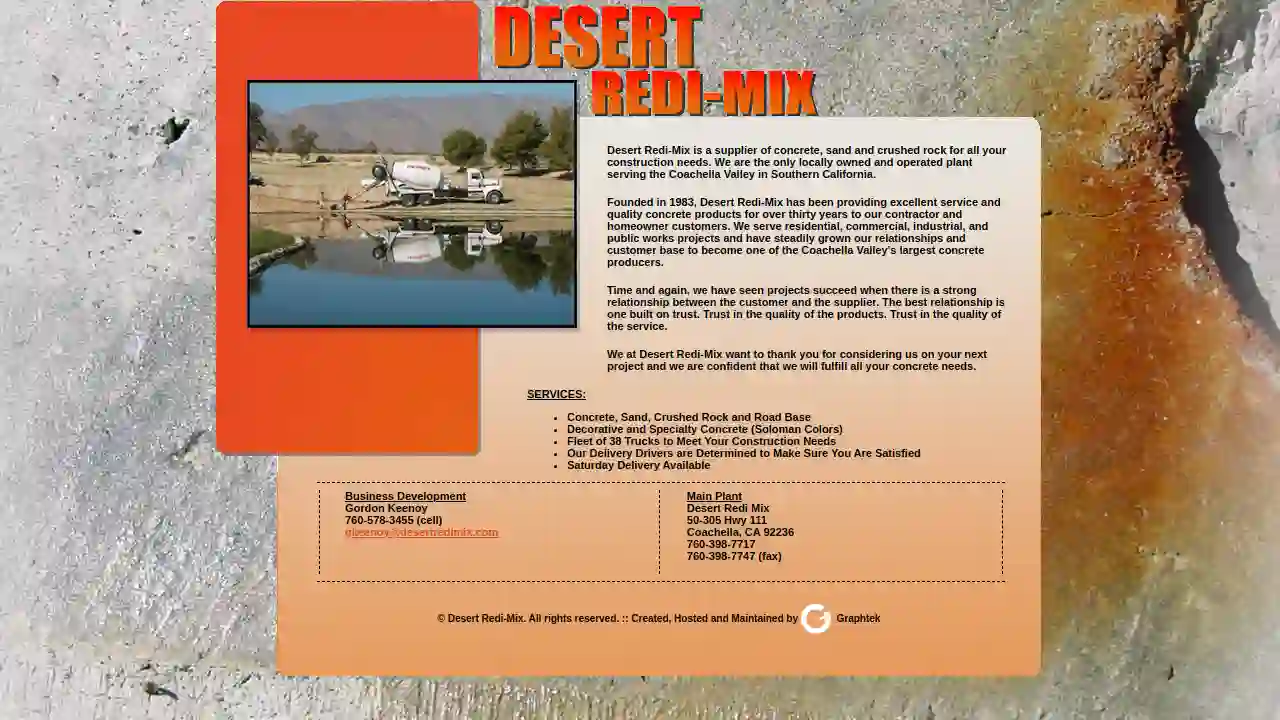Demolition Contractors Woodhaven
Best Demolition Contractors in Woodhaven
Get up to 3 Demo Contractor quotes for your project today! Compare profiles, reviews, accreditations, portfolio, etc... and choose the best offer.

North Land Excavating LLC
585 reviewsGreenville, USLicensed Installers of Septic Systems & Septic Tanks In Grand Rapids MI North Land Excavating LLC is a trusted and experienced excavation company serving the Grand Rapids, Michigan area. We specialize in a wide range of services, including septic system installation and replacement, residential and commercial excavation, land clearing, demolition, and site preparation. Our team of skilled professionals is committed to providing high-quality workmanship and exceptional customer service. We are fully licensed and insured, and we use only the best equipment and materials to ensure that your project is completed to the highest standards. Whether you need a new septic system installed, your property cleared for construction, or a demolition project completed, North Land Excavating LLC is the company to call. Contact us today for a free estimate!
- Services
- Why Us?
- Our Team
- Gallery
Get Quote
Cutting Edge Excavating
4.340 reviews5182 Chicago Dr, Hudsonville, 49426, USTHEN 2009 NOW 2023 Cutting Edge Excavating is a family-owned business founded in March 2009 by the Nykamp family, leveraging their 35 years of combined experience in the excavation industry. We began as a close-knit team of 6, driven by a shared commitment to delivering exceptional excavation services. Our dedication to growth and investment has allowed us to assemble a skilled team of 34 full-time employees. This expansion enables us to provide a comprehensive range of commercial, industrial, municipal, and residential excavation services. We own and operate a fleet of 19 local trucks, ensuring our team has the resources they need to efficiently complete projects of all sizes and complexities. This commitment to in-house equipment and personnel means we can provide our clients with greater control over project timelines and quality. In 2020, we faced a significant setback with a fire destroying our building. However, the unwavering determination of our team fueled a full recovery. We’re proud to call a brand-new facility our home, featuring a spacious 2-story, 9,000 square foot shop and office space, on the same property our old 7,800 square foot warehouse and storage facility stood, in Hudsonville, Michigan. At Cutting Edge Excavating, our mission remains clear: completing your projects on time, professionally, and at a fair price. We look forward to partnering with you on your next excavation project.. The Family
- Services
- Why Us?
- Our Team
- Gallery
Get Quote
James E Fulton & Sons Inc
3.513 reviews2516 Miller Road, Kalamazoo, 49001, USUse our TEAM to make your DREAM. James E. Fulton & Sons has been providing Southwest Michigan with trusted excavating services since 1971. Our team is dedicated to completing each project with outstanding quality and service. We are committed to continually improving our ability to serve our customers, year after year. Why Choose Fulton Excavating? James E. Fulton & Sons has contributed to the growth of Kalamazoo and the surrounding region. We know the dirt business. Over the decades, we have been providing the community with land construction and excavation services. Our team of highly skilled and organized professionals is well-equipped to handle all of your commercial and industrial needs. Our Commitment to Excellence 100% Committed to Safety Fully Trained and Certified A+ Rated Insured & Fully Bonded Fully Knowledgeable in Prevailing Wage Licensed and MDOT Qualified We Strive to Be the Best!
- Services
- Why Us?
- Testimonials
- Gallery
Get Quote
Redbeard Excavating
54 reviews17924 M-140 HWY, South Haven, 49090, USRedbeard Excavating: Your Trusted Excavation Contractor Redbeard Excavating is a leading excavation contractor serving the South Haven, MI area. With nearly 20 years of experience, we specialize in a wide range of construction services including site work-prep, sewer and septic installation, utility work, road construction, and landscaping. Our team of skilled professionals is dedicated to delivering high-quality results and exceeding our clients' expectations on every project. Excavation Excellence: A Showcase of Redbeard Excavating's Projects See what our clients have to say!
- Services
- Why Us?
- Gallery
Get Quote
Hall's Trucking & Excavating
57 reviews13637 5 Mile Rd NE, Belding, 48809, USAbout Us We are a family owned and operated business! Denny Hall, owner, has been in the earth-moving business since 1995, and is fully licensed and insured for both Residential and Commercial work. We have company owned equipment which is well maintained. When choosing Hall's Trucking and Excavating, you can expect our great team to work hard on your behalf to get the job done! Our commitment to our customers is to maintain the highest level of quality and deliver cost efficient results without compromising service or safety! Contact Us Better yet, see us in person! We love our customers, so feel free to give us a call or email to set up a time to talk about your project.
- Services
- Why Us?
- Gallery
Get Quote
Jackson Cooper Excavating
51 reviews895 60th St SE, Kentwood, 49508, USCall the Excavation Professionals today! Since 2017, JC Excavating has been providing the greater Kentwood Michigan area with professional excavating services. Our knowledgeable operators will make sure your project is how you want it every time. Want to know more? Contact Us
- Services
- Why Us?
- Gallery
Get Quote
Aazul Home Constructions, LLC.
51 reviews1525 John F. Kennedy Blvd, Jersey City, 07305, USAAZUL HOME CONSTRUCTIONS is leading quality projects. AAZUL HOME CONSTRUCTIONS is committed to providing our clients with quality home renovations, repairs and remodeling. As licensed and insured construction specialists we can manage all your construction needs ensuring that your project is completed on time and on budget; in compliance with all state and local building codes and requirements. We pride ourselves on creating innovative construction solutions. Our goal is to use our knowledge and experience to add value to any project we take on. In short, AAZUL HOME CONSTRUCTIONS means excellence. It's more than construction. AAZUL HOME CONSTRUCTIONS is focused on customer experience, exceeding expectations, meeting objectives and providing value in our projects to all of our clients. Our craftmanship, professionalism and quality of work speak volumes to our core mission of customer satisfaction.
- Services
- Why Us?
- Gallery
Get Quote
L D Clark Excavating Co
4.33 reviews7707 Rickle, Lansing, 48917, USL.D. Clark Companies: Building Your Future L.D. Clark Companies is a family-owned and operated business with a rich history spanning over 40 years. Founded in 1975 by Larry Clark, our company has grown into a trusted name in the Lansing, Michigan area, known for its commitment to quality, integrity, and customer satisfaction. Our Mission Our mission is to provide our clients with exceptional construction services, exceeding expectations with every project. We strive to build lasting relationships with our customers, earning their trust through our dedication to excellence and unwavering commitment to their vision. Our Services L.D. Clark Companies offers a comprehensive range of construction services, including: Excavating Grading Trucking Foundation Building Aggregates Our Team Our team is comprised of experienced and dedicated professionals who are passionate about their craft. We believe in fostering a collaborative environment where every team member contributes to the success of each project. Our commitment to continuous learning and professional development ensures that our team remains at the forefront of industry best practices. Our Experience L.D. Clark Companies has a proven track record of delivering successful projects for both residential and commercial clients. We have a deep understanding of the local market and are committed to providing our clients with the highest quality construction services at competitive prices.
- Services
- Why Us?
- Testimonials
- Gallery
Get Quote
Desert Redi-Mix
34 reviews50-305 Hwy 111, Coachella, USDesert Redi-Mix: Your Trusted Coachella Valley Concrete Supplier Desert Redi-Mix is your go-to source for high-quality concrete, sand, and crushed rock in the Coachella Valley. We're a locally owned and operated company with over 30 years of experience serving the construction needs of homeowners and contractors alike. Since 1983, we've built a reputation for excellence, providing reliable service and top-notch concrete products. We cater to residential, commercial, industrial, and public works projects, and our commitment to customer satisfaction has made us one of the Coachella Valley's leading concrete producers. We understand that successful projects rely on strong partnerships. That's why we prioritize building trust with our customers. Trust in the quality of our products. Trust in the quality of our service. Thank you for considering Desert Redi-Mix for your next project. We're confident in our ability to meet all your concrete needs.
- Services
- Why Us?
- Our Team
- Gallery
Get Quote
Soil Friends Excavation L.L.C.
535 reviewsGalesburg, 49053, USStart Your Project on Solid Ground Work with landscapers in the Galesburg, Ross Township, Portage, Battle Creek, Kalamazoo & Richland, MI area Before you can start your next property improvement or construction project, you'll need a team of reliable excavation landscapers to prepare your site. Soil Friends Excavating, LLC is a top choice for residential and commercial clients in the Galesburg, Ross Township, Portage, Battle Creek, Kalamazoo & Richland, MI areas. Your satisfaction is our top priority, so we'll make sure we're meeting your goals at every stage of your project. Call 269-348-1567 now for a free consultation and estimate on our site preparation services. When to call our excavation team If you don't do a lot of large-scale property improvement projects, you might not know when you need to call a landscaper. You'll want to reach out to our team if... You have water coming into your home and need to fix your drainage You need new soil or grass to restore your lawn to peak condition You need some of the trees cut down on your property's wooded areas You're installing a new driveway, garden, drainage system or other features We'll make sure your site is prepared for a successful project of any scale. Consult our site preparation team on your project today. Choose an experienced excavation crew Wondering what makes Soil Friends Excavating the right choice for your project? We're a local family business with three generations of experience. If your project requires heavy equipment work, we'll get the job done quickly and correctly.
- Services
- Why Us?
- Gallery
Get Quote
Over 22,076+ Excavation Contractors in our network
Our excavation pros operate in Woodhaven and beyond!
ExcavationHQ has curated and vetted Top Excavation Businesses near Woodhaven. Find a trustworthy pro today.
Frequently Asked Questions About Demolition Contractors
- Size and Complexity of the Structure: Larger and more complex structures, such as multi-story buildings, require more time, labor, and specialized equipment, increasing costs.
- Type of Demolition: Different demolition methods, such as implosion, wrecking ball, or high-reach demolition, have varying costs.
- Material Disposal: Disposal fees for demolition debris can contribute significantly to the overall cost, depending on the type and quantity of materials.
- Location and Accessibility: Demolition in densely populated areas or with limited access may require more planning and specialized equipment, affecting costs.
- Hazardous Materials: The presence of asbestos, lead paint, or other hazardous materials requires specialized removal and disposal procedures, adding to the expenses.
- Size and Type of Structure: The method should be suitable for the structure's size, height, and construction materials.
- Site Location and Accessibility: The method should be feasible given the site's location, surrounding buildings, and access constraints.
- Environmental Considerations: Prioritize methods that minimize environmental impact, such as deconstruction or selective demolition if feasible.
- Budget: Different demolition methods have varying costs, so choose one that fits your budget.
- Safety: Prioritize methods that ensure worker safety and minimize risks to surrounding areas.
- Enclosure: Sealing off the asbestos-containing material to prevent fiber release.
- Encapsulation: Coating the asbestos-containing material with a sealant to bind the fibers.
- Removal: Carefully removing the asbestos-containing material and disposing of it safely.
How much does demolition cost in the USA?
How do I choose the right demolition method for my project?
How can I tell if my building contains asbestos?
What are the different methods of asbestos abatement?
How much does demolition cost in the USA?
- Size and Complexity of the Structure: Larger and more complex structures, such as multi-story buildings, require more time, labor, and specialized equipment, increasing costs.
- Type of Demolition: Different demolition methods, such as implosion, wrecking ball, or high-reach demolition, have varying costs.
- Material Disposal: Disposal fees for demolition debris can contribute significantly to the overall cost, depending on the type and quantity of materials.
- Location and Accessibility: Demolition in densely populated areas or with limited access may require more planning and specialized equipment, affecting costs.
- Hazardous Materials: The presence of asbestos, lead paint, or other hazardous materials requires specialized removal and disposal procedures, adding to the expenses.
How do I choose the right demolition method for my project?
- Size and Type of Structure: The method should be suitable for the structure's size, height, and construction materials.
- Site Location and Accessibility: The method should be feasible given the site's location, surrounding buildings, and access constraints.
- Environmental Considerations: Prioritize methods that minimize environmental impact, such as deconstruction or selective demolition if feasible.
- Budget: Different demolition methods have varying costs, so choose one that fits your budget.
- Safety: Prioritize methods that ensure worker safety and minimize risks to surrounding areas.
How can I tell if my building contains asbestos?
What are the different methods of asbestos abatement?
- Enclosure: Sealing off the asbestos-containing material to prevent fiber release.
- Encapsulation: Coating the asbestos-containing material with a sealant to bind the fibers.
- Removal: Carefully removing the asbestos-containing material and disposing of it safely.